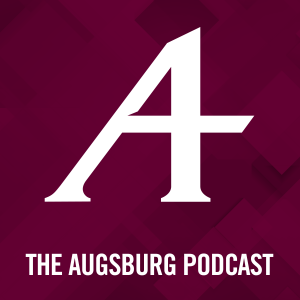The Augsburg Podcast

Merilee Klemp: The Power of Improvisation
Merilee Klemp: Augsburg has always taken diamonds in the rough, and polished them up and put them in a place where they can be competitive in the real world.
Paul Pribbenow: I'm Paul Pribbenow, President of Augsburg University. Augsburg educates students to be informed citizens, thoughtful stewards, critical thinkers and responsible leaders. It's my great privileged to present the Augsburg podcast. One way you can meet some of the faculty and staff I'm honored to work with everyday.
Merilee Klemp: My name is Merilee Klemp. I teach music history. I teach chamber music. I teach obo. I teach some interdisciplinary courses as well as a part of the liberal arts curriculum. My dad was a Luthern minister, and so a Luthern school was a good choice. (laughs) And I had an older sister who attended Augsburg and graduated in 1966, in elementary education, but was in the choir. So I came to a lot of Augsburg music events as I was growing up.
I had mentors early on in elementary school, junior high, senior high that were all trained at Augsburg. There's always been that sort of interest in writing and creative, not just studying music from a history perspective, but that creative is a big part of the history.
Many of the graduates I think in the 50's, 60's and 70's all patterned what they did after their mentors who were um, not only performers of chamber music and choral music, but also were innovators and writing creatively and that was passed on. I think that legacy.
The thing that sort of was the hallmark of Augsburg study of music was they encouraged composition, writing music, performing your own music, and there was a strong jazz program here in the 70's, uh did jazz festivals, had some of the big clinicians who master classes here.
Well I can think of one student who was a violinist who came here in mid 2000's. Was a good violinist, but not an extraordinary violinist, but she was really interested in becoming a conductor and she worked um, hard on her conducting skills, her historical skills, her education courses and I think her first job was a Kennedy High School. Was somebody who really embraced her students and tried to find opportunities, and now she's at St. Louis Park High School and has growing the program and she has taken her students to New York. Taken her students to London, and she's built a really exciting high school program. She's invited guest conductors to come in and work with her students. Uh, she's still learning. She works with her former mentors. Uh, it's been a transformative experience. I never thought that she would become a conductor, but she has become a wonderful mentor to her students and high school.
She's built a thriving program, and whether those students go on in music or not they have a great experience and it builds life long friendships and gives them opportunities that most of some of those students would never have without being a participant in that program with Merriam.
One of the things that Augsburg always done they never have had a lot of money. Very small endowment so it's sort of a do it yourself (laughs) sort of attitude, and there wasn't the kind of support. Um, so what that requires people is to make it up yourself. You say "Okay that didn't exist before, but I can make something for this, and I can you know, rub two nickels together and get a quarter." There is a sort of a certain do it yourself attitude which is actually um, how you think, make things happen in the world today.
So you think of all the various different music groups and chamber groups. The young startup groups developed their own kind of identity, whether it's in the pop music field or whether it's in choral singing. I can think of one student named Andrew Cain who was a wonderful singer, had perfect pitch, and he's been uh, since he graduated in I think 2010 or something like that he's been in vocal lessons. He's been in Rose Ensemble. Now he has uh, his own group called Mirandola. So uh, figuring out what you want to do and then making it happen so that spirit of entrepreneurship, of do it yourself making it up, you do your own publicity, uh, if you have a vision for what you want to do then you go after it, and sort of do it yourself and that sort of attitude of having a passion, filling a void and then getting yourself out there.
Um, this was something that Augsburg has always trained students to do that, but it, it's that spirit of making it happen. (laughing) It encourages creativity um, but uh, besides uh, creativity it also encourages students to seek out what is their passion and then how can I do what I want to do.
Augsburg has always had a mission um, for taking diamonds in the rough. (laughing) So those are those people who maybe haven't had the advantage or, or a lot of professional training before they get here. Can think of one of my former obo students who grew up in a small South Dakota town and had some training, but not a lot. This person is now principal of Wessa Duluth Symphony and plays principal over in Minnesota opera.
Paul Pribbenow: That was Merilee Klemp professor of music at Augsburg University. Thanks for listening to the Augsburg podcast. I'm President Paul Pribbenow. For more information please visit augsburg.edu.






 Visit Podcast Website
Visit Podcast Website RSS Podcast Feed
RSS Podcast Feed Subscribe
Subscribe
 Add to MyCast
Add to MyCast